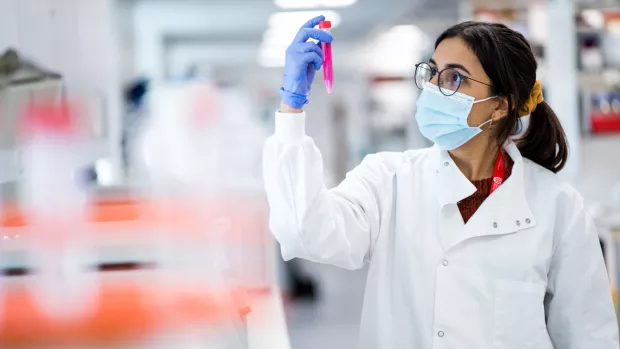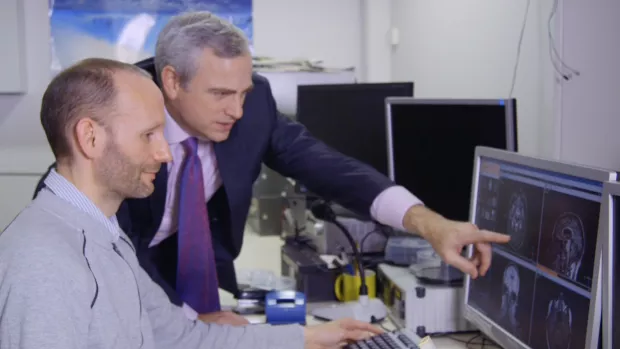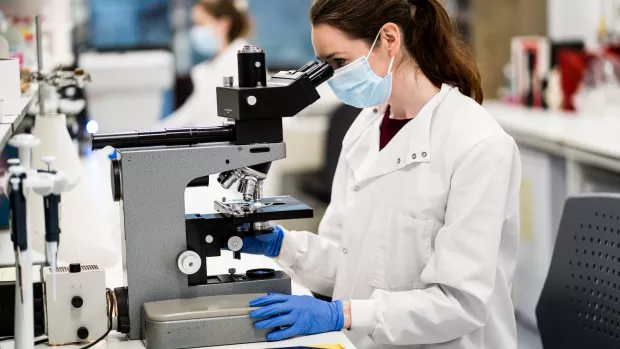
MS drugs being trialled as coronavirus treatments
Several drugs licensed for people with MS are being tested as possible treatments for COVID-19.
All the disease modifying therapies (DMTs) currently available for MS work by reducing immune attacks on the myelin coating that surrounds nerves. A number of them are being investigated to see if they can help people with COVID-19. But we won’t know if these drugs will work for coronavirus until they’ve been through rigorous clinical trials.
What DMTs are being investigated for COVID-19?
Beta interferon
Several trials are looking at whether beta interferon, a drug commonly used for relapsing for MS, can be used to treat people with COVID-19.
Your body makes interferons, a type of protein, to dampen down inflammation. But the interferon drugs used for MS are man-made. They can reduce (and might prevent) the inflammation that damages nerves in MS. The beta interferon drugs licensed for relapsing MS include Avonex, Betaferon, Extavia, Plegridy and Rebif. They’re all injected under the skin.
Right now there are dozens of trials testing different types and doses of beta interferon for COVID-19. Some of the beta interferons being tested for COVID-19 are injected and some are inhaled directly into the lungs as a mist.
So far several small trials (including one from Hong Kong and one from Iran) have shown that beta interferon could hold promise as a treatment for coronavirus, but this needs further investigation. Studies on cells in the lab have also shown that interferons can block COVID-19 infection.
A UK company called Synairgen is also leading a small clinical trial testing whether a beta interferon mist could be used to treat COVID-19. The preliminary findings were positive but the full results haven’t yet been published in a peer-reviewed scientific journal.
You can read a review of research into beta-interferon and COVID-19 on the ScienceDirect website.
Fingolimod
Fingolimod is also being tested as a possible treatment for the severe breathing difficulties that affect some people with COVID-19.
In MS, immune cells attack the myelin covering around your nerves. Fingolimod reduces the myelin damage by stopping the immune cells reaching the nerves in the brain and spinal cord. Fingolimod is available for people with 'highly active' relapsing MS under the brand name Gilenya.
Ibudilast
Ibudilast (also known as MN-166) is being developed for progressive MS by a company MediciNova. It is thought to work by protecting against cell death a A phase 3 trial is being planned for people with secondary progressive MS without relapses. There’s also a trial testing this drug for use in COVID-19 patients.
What does this mean for people with MS?
We don’t yet know whether people with MS who take beta interferon or fingolimod are less vulnerable to COVID-19. We’d need a large scale clinical trial to know for sure, but hopefully emerging data on MS and COVID-19 from around the world will start to give us some clues.
Medical regulations make sure there will be a sufficient supply before a drug can be made available. So there shouldn’t be shortages of these drugs for people with MS now or in the future.
If you’re currently taking beta interferon or fingolimod read our guidance on MS DMTs and coronavirus.
Take part in MS and coronavirus research
We need you to help us understand more about the impact of coronavirus on people with MS and find out if there are any links between MS DMTs and coronavirus.
We’re supporting the UK MS Register to run a survey looking at how COVID-19 is affecting people with MS.
Take the COVID-19 survey on the MS Register website
Find out more about trials of MS drugs for COVID-19 on ClinicalTrials.gov or the Be Part of Research website.
We're here for you
If you want to talk about anything in this article, our MS Helpline is here with emotional support and information for everyone living with MS. The lines are open Monday to Friday, 9am to 7pm except bank holidays. Call freephone 0808 800 8000 or email [email protected].
Find information webinars, ways to connect with other people in our community and ideas to keep you busy in lockdown on our Never Alone hub page.
This blog was originally published in May 2020. It was updated in July 2020 to include information about the latest COVID-19 research.



